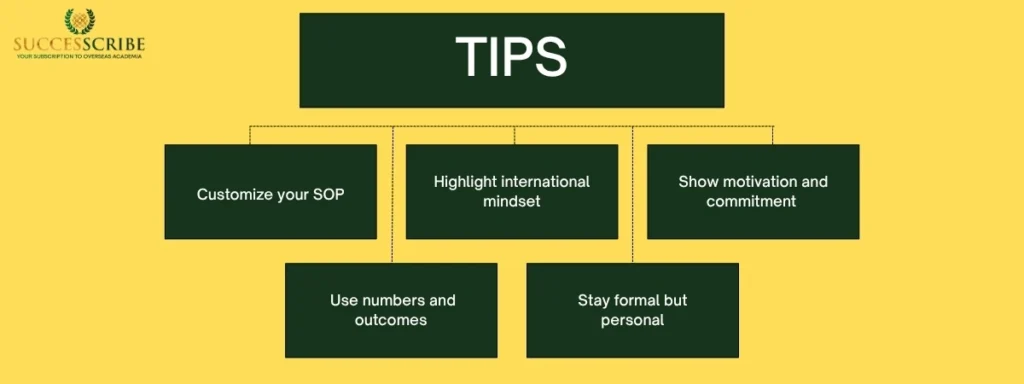Crafting a strong and personalized Statement of Purpose (SOP) is a critical step for students aiming to pursue an MBA in one of Europe’s most sought-after destinations, Germany. Known for its world-class business schools, industry-oriented education system, and affordable tuition, Germany attracts thousands of international students each year. However, standing out in a competitive applicant pool requires more than just academic credentials or work experience.
This is where a well-structured, clear, and compelling Sample SOP for MBA in Germany can make all the difference. It helps admissions committees understand your motivations, career goals, leadership potential, and fit for the specific MBA program. In this comprehensive guide, we’ll walk you through the ideal structure, common mistakes to avoid, how Germany’s SOPs differ from those of other countries, and provide a realistic sample SOP to help you write your own.
Why SOP Matters for MBA in Germany?
In Germany, MBA admissions committees use SOPs to assess:
| Purpose of SOP | Description |
| Academic Fit | Whether your previous studies align with the MBA curriculum |
| Career Goals | Your short-term and long-term professional vision |
| Motivation | Why you want to pursue MBA in Germany |
| Cultural Fit | Your adaptability to the German academic and business environment |
| Communication Skills | Your ability to express ideas clearly and professionally |
Unlike countries that heavily weigh GPA or GMAT scores, German universities give significant weight to holistic profiles, making your SOP a vital tool.
Suggested Post: Letter of recommendation for study abroad
Structure of an Ideal SOP for MBA in Germany

Before we get into the sample, here’s the ideal structure of an SOP tailored for German MBA programs:
| Section | Word Count | Purpose |
| Introduction | 100–150 | Brief self-introduction and motivation |
| Academic Background | 200–300 | Undergraduate studies and relevant coursework |
| Professional Experience | 400–500 | Key roles, achievements, and skills gained |
| Why MBA & Why Germany | 300–400 | Career vision, importance of MBA, and country choice |
| Why this University | 300–400 | Specific reasons for selecting the program |
Sample SOP for MBA in Germany(Approx. 1200–1500 Words)

MBA Application – Mannheim Business School, Germany
Introduction
With a background in engineering and over four years of experience in business development, I have come to recognize the need for a structured, global, and multidisciplinary business education. My decision to pursue an MBA from Germany stems from my ambition to transition into a strategic role in the consulting industry and contribute to sustainable global business practices. I firmly believe that the MBA program at Mannheim Business School aligns perfectly with my academic goals and professional aspirations.
Academic Background
I graduated in 2018 with a Bachelor of Technology in Mechanical Engineering from the Indian Institute of Technology (IIT Delhi), one of the most prestigious engineering institutions in India. My undergraduate education laid a strong foundation in analytical thinking, problem-solving, and quantitative reasoning.
During my final year, I opted for elective subjects like Operations Research, Industrial Management, and Business Analytics, which piqued my interest in business strategy and decision-making. My academic performance (CGPA: 8.5/10) reflects my consistent dedication. I was also actively involved in the Entrepreneurship Cell at IIT Delhi, which exposed me to real-world business challenges and startup culture.
Professional Experience
Post-graduation, I joined Tata Consultancy Services (TCS) as a Business Analyst. Over the past four years, I’ve worked on multiple client engagements across retail, logistics, and fintech sectors, with a focus on process improvement and client relationship management.
At TCS, I led a cross-functional team to improve the supply chain efficiency of a Fortune 500 retail client by implementing an automated inventory tracking system, which reduced delays by 23%. I was promoted within two years to the role of Senior Business Analyst, a recognition of my leadership and business acumen.
I have worked closely with international clients in Germany, the UK, and Singapore, which has sharpened my cross-cultural communication skills.
These experiences solidified my decision to pursue an MBA, as I realized the importance of formal training in finance, marketing, leadership, and global strategy to take on higher managerial roles.
Why MBA and Why Germany
An MBA is the ideal next step in my journey toward becoming a global business leader. I wish to specialize in Strategy and Innovation, and gain a structured understanding of business models, international finance, and market entry strategies.
Germany, with its world-renowned business schools, innovative ecosystem, and industry strength in sectors like automotive, consulting, and renewable energy, is the perfect environment to learn and grow. The German dual education system, combined with a strong economy and openness to international talent, makes it highly attractive for MBA aspirants.
Moreover, the affordability of German MBA programs (compared to the US or UK), the multicultural environment, and the opportunity to learn in one of Europe’s strongest economies are key reasons why I’ve chosen Germany.
Why Mannheim Business School
Mannheim Business School stands out for its triple accreditation (AACSB, EQUIS, and AMBA) and outstanding reputation across Europe. Several aspects draw me to this school:
- Curriculum: The rigorous and balanced curriculum with electives in digital innovation and sustainability fits my interests perfectly.
- Career Services: The school’s strong placement record, corporate connections with McKinsey, BCG, and Siemens, and alumni network are highly motivating.
- International Exposure: The Mannheim MBA offers international exchange programs with ESSEC (France) and NUS (Singapore), both of which appeal to my global career aspirations.
- German Language & Culture Immersion: Although the program is taught in English, I am actively learning German (A2 Level) to integrate better into the culture and work environment.
Short-Term and Long-Term Goals:
In the short term, I aim to transition into a strategy consulting role at a global consulting firm such as BCG or Roland Berger. My experience in business analysis, combined with MBA learnings, will enable me to deliver value in client engagements across Europe and Asia.
Long-term, I aspire to become a Chief Strategy Officer (CSO) in a multinational firm or start my own consulting venture focused on digital transformation and sustainability in emerging markets.
I believe an MBA from Mannheim will serve as a launchpad for these goals.
In conclusion, I am confident that the Mannheim MBA will provide me with the platform to grow as a global business leader with a socially responsible vision. I bring with me a solid foundation in engineering, relevant business experience, cultural adaptability, and a passion for lifelong learning. I look forward to contributing to the vibrant student community at Mannheim and becoming an impactful alum of this esteemed institution.
Suggested Post: Scholarships for masters in Germany
Tips to Write a Strong SOP for MBA in Germany

| Tip | Description |
| Customize your SOP | Tailor it for each university with specific details (course modules, faculty, clubs) |
| Highlight international mindset | Germany values diversity and global exposure |
| Show motivation and commitment | Explain why Germany and this MBA are essential for your growth |
| Use numbers and outcomes | “Increased revenue by 15%” speaks louder than generic claims |
| Stay formal but personal | Maintain a balance of professionalism and storytelling |
| Keep it concise | Ideal word count: 800–1200 words |
| Mention German language efforts | Even basic knowledge is a plus point |
Top Universities in Germany Accepting MBA SOPs

Here’s a table with some top German business schools that require SOPs:
| University | MBA Program | SOP Requirement | Notes |
| Mannheim Business School | Full-Time MBA | Required | Strong focus on international applicants |
| WHU – Otto Beisheim School of Management | MBA & EMBA | Required | Accepts GMAT/GRE or BAT |
| ESMT Berlin | MBA & EMBA | Required | Triple-accredited; global leadership focus |
| Frankfurt School of Finance & Management | Full-Time MBA | Required | Ranked top 10 in Europe |
| HHL Leipzig Graduate School of Management | MBA | Required | Strong alumni & placement network |
| TU Munich (TUM School of Management) | Executive MBA | SOP recommended | Strong tech-business blend |
Suggested Post: Scholarships for undergraduates in Germany
Common Mistakes to Avoid in MBA SOPs
Crafting a powerful SOP for an MBA in Germany requires clarity, structure, and personalization. However, many applicants unknowingly make errors that can significantly weaken their application. Below is a detailed table of the most frequent SOP mistakes, and how to avoid them:
| Mistake | Explanation | Why It’s a Problem | How to Avoid |
| 1. Generic or Template-Based SOP | Using the same SOP for every university without personalization. | Shows a lack of effort and seriousness; fails to demonstrate fit. | Customize each SOP by referencing the specific program, faculty, modules, or university strengths. |
| 2. Overuse of Buzzwords & Clichés | Excessive use of terms like “passionate”, “dream”, “dynamic leader”, without evidence. | Makes the SOP vague and unimpressive. | Back every claim with examples, achievements, or metrics. |
| 3. Too Much Technical Jargon | Writing as if it’s a technical project report. | Business schools want leadership and management insight, not engineering-heavy details. | Focus on impact, leadership, and outcomes rather than tools or code. |
| 4. Lack of Structure and Flow | Jumping between topics randomly without logical connection. | Confuses the reader; important points may be lost. | Use a clear structure: Introduction → Academics → Work Experience → Why MBA → Goals → Conclusion. |
| 5. Exaggeration or False Claims | Inflating achievements or responsibilities. | Easy for the committee to detect and verify. Damages credibility. | Stay honest. Admissions officers value integrity more than perfection. |
| 6. Weak Career Goals | Vague or unrealistic plans (e.g., “I want to become CEO of Google”). | Makes it hard for the committee to judge your clarity and seriousness. | Define short- and long-term goals clearly, supported by current experience and future vision. |
| 7. Ignoring German Cultural Context | Not showing awareness of studying and living in Germany. | Suggests lack of research or commitment to integrating. | Mention basic German language skills, understanding of German work culture, or international mindset. |
| 8. No Mention of the University Itself | Writing a generic SOP without discussing why you chose that specific university. | Fails to demonstrate a strong interest or fit. | Include unique features: curriculum highlights, location, alumni success, internships. |
| 9. Overly Formal or Robotic Tone | Writing in overly academic or impersonal language. | Disconnects the reader; fails to create a human connection. | Use a professional but conversational tone. Let your personality reflect naturally. |
| 10. Grammatical and Typographical Errors | Spelling mistakes, poor punctuation, or incorrect grammar. | Shows carelessness and poor communication skills. | Proofread multiple times or use tools like Grammarly. Ask a mentor or consultant to review. |
| 11. Being Too Modest or Too Arrogant | Underselling your skills or over-hyping your profile. | Either extreme fails to convince the reader of your true value. | Find a balance: express achievements confidently but humbly. |
| 12. Writing a CV in Paragraph Form | Listing work experience or education as if it’s a resume. | Repetitive and adds no new value to the application. | Use the SOP to explain the why and how behind your roles, not just the what. |
| 13. Ignoring Word Limits or Format Guidelines | Submitting an SOP that is too long, too short, or in the wrong format. | Shows failure to follow instructions; may lead to disqualification. | Adhere to guidelines provided by the university. Keep it concise (800–1200 words). |
Suggested Post: TOEFL accepting universities in Germany
Difference in SOP for Germany vs. Other Countries
Every country has its own expectations and academic culture, which is reflected in how SOPs (Statements of Purpose) are written and evaluated. While the core idea of an SOP, highlighting your background, goals, and reasons for choosing the program, remains the same, the tone, structure, and emphasis vary significantly across countries.
| Criteria | Germany | USA | Canada | UK | Australia |
| Tone & Style | Formal, concise, factual, and logical | Story-driven, expressive, personal | Balanced, professional and goal-oriented | Highly concise and academic | Balanced and slightly narrative |
| Length | 800–1200 words | 1000–1500 words | 750–1000 words | 500–800 words | 800–1000 words |
| Focus | Career goals, work experience, practical fit, and German industry. | Personal journey, creativity, motivation, academic + personal blend | Academic history, research interests, program alignment | Future goals and academic fit | Career-oriented, program relevance, and employability |
| Language Proficiency Mention | Often includes German language effort (even if course is in English) | Focus on English proficiency only | English proficiency focus | English proficiency focus | English proficiency focus |
| Academic vs. Professional Emphasis | Strong emphasis on work experience and practical exposure | Equal emphasis on academics and extracurriculars | Slightly more on academics and logical progression | Academically driven | Career and skills-oriented |
| Cultural Fit | Expected to show knowledge of German work/study culture | Encouraged to show values alignment with university culture | Important, especially in PR pathways | Less emphasized but still relevant | Important for long-term goals |
| SOP Customization | Must mention specific German university, program modules, and alignment with the job market | Can be more creative and thematic | Should mention specific reasons for program/university choice | Highly specific to course/university | Should show career progression and how the program fits into it |
| Use of Metrics/Examples | Highly encouraged (e.g., “Reduced costs by 15%”) | Also encouraged but more storytelling-based | Metrics + clear articulation of skills are expected | Less on metrics, more academic clarity | Balance between personal and professional impact |
| Importance of SOP | Very high especially for English-taught MBA and MS programs | Extremely high central to holistic admission | Important but shared with LORs and academic records | One of several components (with predicted scores & LORs) | Important for both admissions and visa processing |
Conclusion
A strong SOP for MBA in Germany is your personal marketing tool. It tells your story, explains your ambition, and makes a compelling case for your admission. German B-schools look beyond numbers, they want well-rounded, driven, and globally aware individuals.
Germany offers immense opportunities post-MBA, especially in management, consulting, and tech-business intersections. Investing time into crafting a customized, well-thought SOP will help you maximize your chances of securing admission and scholarships.
FAQs
What is the ideal word count for SOP for MBA in Germany?
800 to 1200 words is generally acceptable. Always check specific university requirements.
Is SOP mandatory for MBA applications in Germany?
Yes, most top German universities and business schools require an SOP as part of the application.
Can I reuse my SOP for multiple German universities?
You can reuse the base structure but must personalize each SOP for the respective university and program.
Can I get admission to an MBA in Germany without work experience?
Some programs accept freshers, but most require 2–5 years of work experience. A strong SOP helps in such cases.
Do I need to mention German language proficiency?
Yes, even basic German (A1 or A2) can give your application an edge.
Related Post
Technical University Berlin Acceptance Rate
Heidelberg University Acceptance Rate
University of Hamburg Acceptance Rate
Free University of Berlin Acceptance Rate















